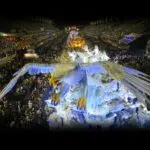Fasching, on February 28, is a religious festival that brings joy, fun, parades, costumes, and an opportunity to break free from the rut. Starting in mid-November, Fasching goes on till February and ends with a bang. And yes, by that we are referring to a Karneval where people go all out with the celebrations. On the day of the Karneval, you can dress up fancy and wear a mask, dance on the streets, be a part of a comical skit, or attend a masquerade ball! The idea is to stand up against the rulers that you feel oppress you in any way by enjoying the day as much as you can.
History of Fasching
The German Carnival period known as Fasching is also called the ‘fifth season,’ and in today’s time, it is considered to be a festival where people celebrate the end of winter. However, this is not why Fasching was originally celebrated. The festival has existed since the pre-Roman era and was considered a time when people could be free and enjoy their lives. This means all that they had to do was host activities that were all about having fun. But the ‘fun’ factor did not just mean conducting carnivals. During medieval times, the festival was used to make fun of the oppressive rulers of the region and point out all their flaws. This is why all carnival-goers dressed up and wore masks to hide their identity. If they were caught making fun of the rulers, the death penalty was inevitable.
Some intriguing customs of the festival include handing over the keys of the city to a council of fools or letting women rule for the day. In some regions, a parade to honor women started to be held.
Officially, the festival begins on the 11th hour of the 11th day of the 11th month of the year. However, the festivities occur once winter ends. While Fasching has several big days, the Rose Monday parade is among the most important. The final parade for Mardi Gras in New Orleans is on Tuesday. It is also important to note that Fasching is mostly celebrated by Christians.
Fasching timeline
The word ‘Fasching’ is established and is derived from the Germanic word ‘vaschanc.’
Fasching is established in Cologne.
The Karneval is institutionalized in regions of the Rhine.
The first modern Karneval parade takes place in Cologne.
Fasching FAQs
What is traditionally eaten during Fasching?
During Fasching, people consume fat, meat, lard, eggs, and milk products.
What countries celebrate Fasching?
Fasching is celebrated in parts of eastern and southern Germany, as well as in Austria.
Why do people wear costumes in carnivals?
People wear costumes to dress up and have fun.
How to Observe Fasching
Visit a parade
If you want to go all out for Fasching, attend a parade and party all day. This way you get to dress up, drink, dance, and walk around the city with new people.
Throw a ball
Want to be a part of something small yet fun? Throw a ball with the help of some friends and invite people you know. Everyone can wear masks during the event and be merry.
Wear a costume
Wearing costumes has always been a very important part of celebrating Fasching. So use this event to dig up some old and fancy costumes and dress up! This could actually turn out to be a fun family celebration too.
5 Fascinating Facts About Fasching
Another name
It is called Fasnacht in Switzerland.
The activities for the young
They wear masks and collect food door to door.
Fasching sessions
They were originally organized by carnival clubs that invited guests.
The most popular musical piece performed
Narrhallamarsch is performed.
Originally a Catholic tradition
With time, Protestants started celebrating it too.
Why Fasching is Important
It’s fun
The festival is super fun and gives people a chance to break out of their shells and party. It also gives everyone a chance to dance away the night without worry on their minds.
It is traditional
Fasching is a traditional occasion that dates back to Roman times, hence, its celebration is bound to help you connect with your roots and age-old traditions. Plus, the event is a good time to educate children regarding the past.
It gives us a chance to mingle
Festivals such as these are important as they provide people with the opportunity to break out of their regular schedules, and take some time out for friends and family. It also gives us a chance to bond with the kids.
Fasching dates
| Year | Date | Day |
|---|---|---|
| 2025 | February 28 | Friday |
| 2026 | February 28 | Saturday |
| 2027 | February 28 | Sunday |
| 2028 | February 28 | Monday |
| 2029 | February 28 | Wednesday |























